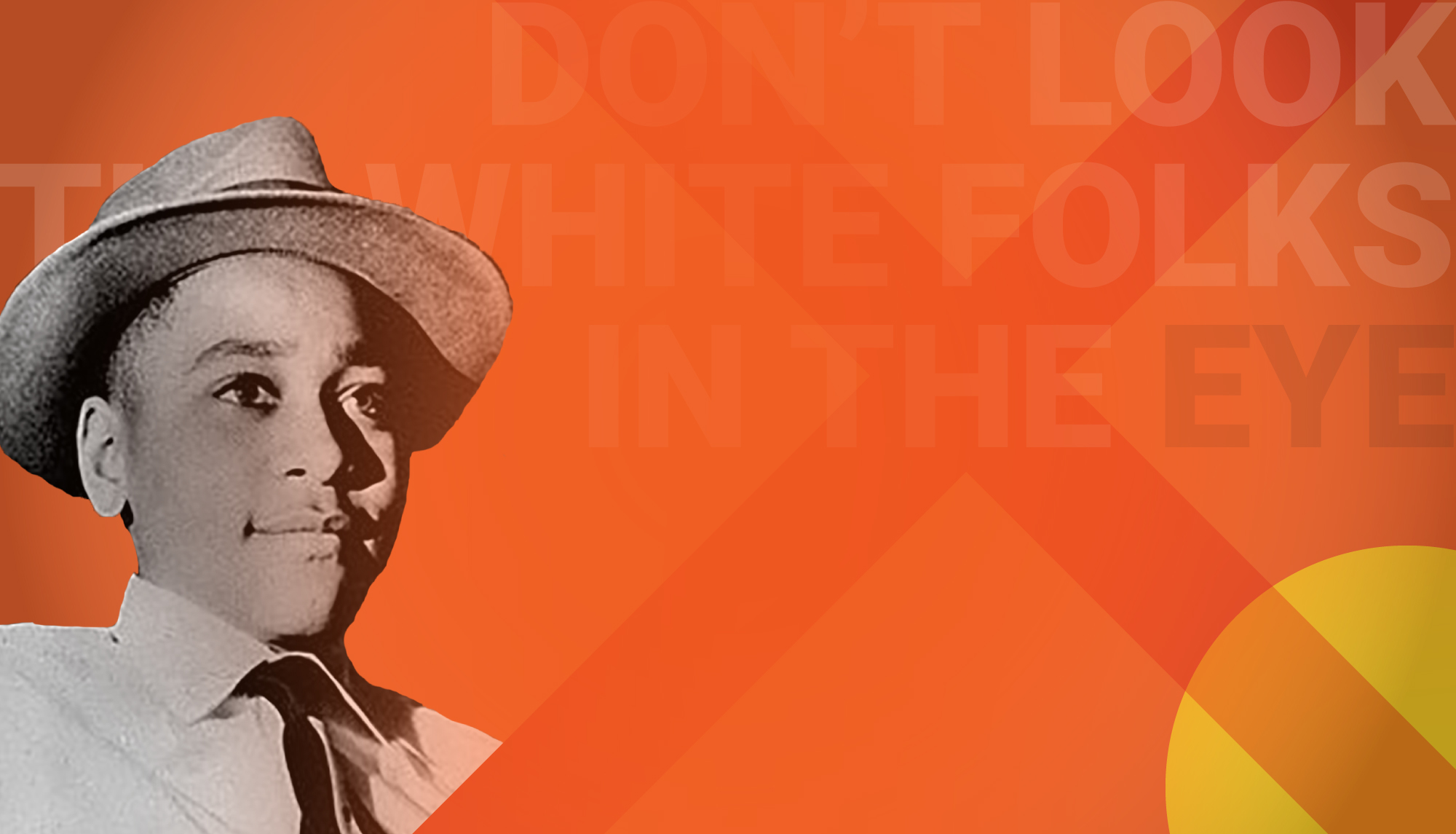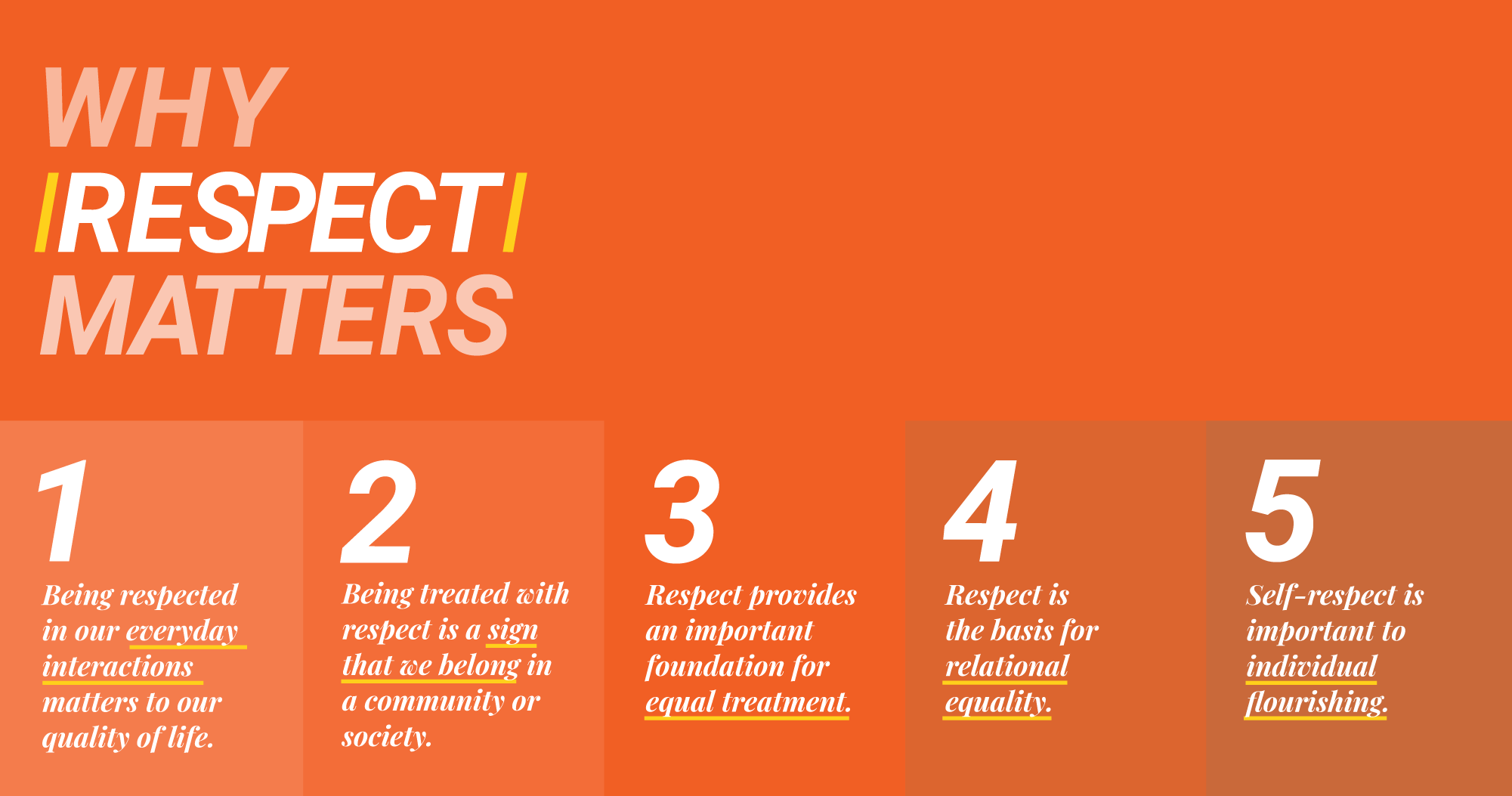
RESPECT
“Don’t look the white folks in the eye.”
This was the advice given to 14-year-old Emmett Till by his mother before he traveled from Chicago to Mississippi, in the summer of 1955. Emmett did more than this, allegedly rising to a dare from his friends to flirt with a white woman. A few days later he was brutally beaten and murdered. At Emmett’s funeral, at his mother’s insistence, his corpse was shown as it had been found. The image of Emmett’s mutilated body generated national outrage and helped spark the civil rights movement. A similar moment may be occurring as we write, with national, and even global, protests at the killing of George Floyd in Minneapolis.

To look another person in the eye is an assertion of civic and moral equality. Members of an “inferior” race, class, or gender are supposed to lower their eyes in deference. When we lack respect for someone, we “look down” on them. A true republic of equals is one where every individual “can speak their minds, walk tall among their fellows, and look each other squarely in the eye,” as Princeton philosopher Philip Pettit writes (channeling John Milton): “They can command respect from those with whom they deal.”
As we’ve argued throughout this volume, the quality of life of the middle class should be measured not only in dollars and hours and life expectancy, but in terms of personal relationships and health. But respect matters too. Respect is demonstrated in the way we treat each other in daily life, and in the way we think about each other as members of our shared community.
Why respect matters
How does respect influence our quality of life?
First, the degree to which we feel respected in our interpersonal interactions matters. Disrespect between spouses is the strongest predictor of divorce (rolling your eyes is, not coincidentally, one of the best physical indicators). But the way we treat every single person we encounter matters, especially as those interactions accumulate over the course of a day. As we argued above, quality of life is a relational good, and good relationships are founded on mutual respect.
Second, being treated with respect is a sign that we belong in a community or society, and a sense of belonging matters. Humans are naturally group-oriented creatures, and one of the challenges of large, dense, diverse modern societies is creating solidarity among strangers. Respect is a signal of mutual membership of society. To “diss” someone is to socially wound them.
Third, respect provides an important foundation for equal treatment. Discrimination should be seen as the ultimate form of disrespect. Interpersonal racism, for example, is disrespect of perhaps the deepest kind. Studies have shown that police officers treat Black and Hispanic people with less respect in routine traffic stops and that white people are largely exempt from this type of police scrutiny. A lack of respect across lines of difference – whether by race, age, class, religion, sex or geography – fatally undermines pluralism and equality. Sexual harassment can be seen in a similar frame, indicative not only of unequal power relations, but of a lack of respect.
Snobbery too is a form of disrespect. If some of our fellow citizens are described as “white trash” or “deplorables,” “clinging to their guns and bibles,” they may not be wrong to feel disrespected. To be clear, we are not saying that these expressions of disrespect are of the same order, especially regarding the treatment of Black Americans. Our point is simply that disrespect can cut across many different lines.
Fourth, respect is the basis for relational equality – of equal standing – and provides the moral basis for other kinds of equality, including legal rights and material resources. Systems of social insurance rely on a collective sense of citizenship – of what we owe each other – which in turn rests on holding each other in equal respect. A lack of respect for another group can lead to a lack of support for policies that provide them with assistance or opportunity, such as welfare policy. Inequalities then deepen, leading to more segregation, which further undermines empathy and respect.
Fifth, self-respect is important to individual flourishing. Of course, it is easier to respect yourself if others respect you (one reason discrimination can lead to such suffering). But respect from the outside alone is not enough. Agency, responsibility and autonomy all depend on respect for oneself. If you prefer the language of psychology, we could use terms here like self-efficacy and self-esteem. But the point would be the same. John Rawls argued for self-respect as a “primary good” because “without [self-respect] nothing may seem worth doing, or if some things have value for us, we lack the will to strive for them.”
It hardly needs to be said that measuring respect is hard, and formulating policies to create respect harder still. But neither of these facts diminish the importance of respect.

A Republic of Respect?
What can we say about the state of respect in America today, especially regarding the middle class? The picture looks mixed. Good news first. Nine of out ten U.S. citizens reported in 2018 that they were “treated with respect all day yesterday.” A similar proportion, including those in the middle class, said they were “treated with respect at work.” This may help to explain why unemployment is so corrosive for wellbeing, especially over an extended period. Two in five people out of work for more than 6 months report a loss of self-respect. This is a reminder that work is much more than just an economic activity.
But it is also true that about half of Black workers say they have been treated unfairly at work because of their race, and four in ten working women report feeling discriminated against because of their gender. Many Americans of color, particularly Hispanic people, as well as those without a college degree, report that they feel “unfairly judged because of the language they use to express themselves.” The education gap on this question is widest for white people, where those without a college degree are 11 percentage points more likely to report feeling judged for their language (34 percent) than their peers with a college degree (23 percent). This is one of many areas where class and race intersect; well-educated Americans need to be careful not to look down on their fellow citizens.
President Trump has accelerated the trend towards a lack of respect in public discourse. Most Americans (85 percent) say that political debate in the U.S. has become less respectful in the last several years. Polarization is no longer just a problem in Congress, but in our communities. More than half of those Americans identifying as Democrats or Republicans now have “very unfavorable” views of those who support the other party. Opponents have become enemies.
There is a nasty feedback loop at work here between voters and politicians. According to Pew, “while most Democrats (78 percent) say it is very important for Republican elected officials to treat Democratic officials with respect, only about half (47 percent) say it is very important for officials from their party to treat Republican politicians with respect.” A similar hypocrisy can be seen among Republican voters. Hopes that the COVID-19 pandemic would heal the nation’s divides were quickly dashed. Attitudes towards the implications of the virus as well as discussions over appropriate policy responses and the President’s handling of the crisis all broke along sharply partisan lines.
Life is about respect. And you have to give it to receive it.
Woman, Las Vegas, NV
Respect is not usually seen as a goal for public policy. But we think it should be. Of course, we don’t mean we should try to find empirical measures of respect that can be included in the regression tables of evaluation studies. We mean policy should be developed in ways that, other things equal, will signal, generate and encourage more respect.
Our most powerful respect-building policy is national service, as described in Chapter 3. Spending time with people different from ourselves, especially if engaged in collective tasks, is proven to reduce prejudice and open minds. It builds social capital – and it builds respect. Other pro-respect policies fall under four headings: education, leadership, politics, and the making of policy itself. We describe each area briefly and offer a specific idea for each.
Learn respect
Respect is a skill as well as a virtue. We all have to learn the challenging civic arts of empathy and restraint. Crucially, we must learn how to distinguish between ideas and identities. We should normally be able to disagree with someone’s ideas without impugning their identity; and someone can disagree with our ideas in the same spirit. This capacity is vital for maintaining respect in the context of fierce disagreement – both of which are essential for democracy. It is in this spirit that Robert Litan argues that high school debate can save America by teaching how to “back up arguments with evidence (not fake news!)…speak persuasively in a civil fashion; and, perhaps most importantly, being able to argue both sides of most any issue or subject.” Initiatives like the intercollegiate Ethics Bowl, which promotes team-based deliberations, should similarly be encouraged.
Social media provides an important platform for interaction, and learning how to operate respectfully in these environments is important. Digital disrespect is a new challenge – and one that can only be solved through applying the right norms or “rules of the road” in these environments. As UNC sociologist Zeynep Tufekci correctly points out, “creating a knowledgeable public requires at least some workable signals that distinguish truth from falsehood [but]…today’s engagement algorithms…espouse no ideals about a healthy public sphere.” A number of measures could help:
- Teaching middle and high school students how to consume and use social media, drawing on new curricula, such as those designed by Project Zero at the Harvard School of Education.
- Social media platforms being much more diligent in verifying the identities of their users. Facebook has already announced it will require identity verification from accounts with “high reach.” It should verify identities for all accounts.
- Improving regulation and fact-checking on the part of the major tech platforms, in order to dilute the impact of “fake news.” Moves in this direction, including signing up to third-party fact-checking services, are welcome, but should be accelerated.
Another specific proposal to build respect among the young is for school boards to require every American student to attend a citizenship ceremony before graduating from high school. These ceremonies are deeply and colorfully patriotic. They are a reminder of the values that make our nation so special; one reason the federal judiciary encourages involvement from schools. Many ceremonies would need to be moved to larger venues, as some already have, perhaps to the auditorium of the high school itself, or to a local theater or other civic space. They could become community events, rather than just family ones. Perhaps high schoolers could also take the same citizenship test as new Americans before graduating.
The goal here is to improve the way that Americans view immigrants – who have historically been the source of the next middle class.
Model respect
Respect is shown in very direct and personal ways. But it is also modeled for us – or not – by public figures. As noted above, most Americans see our political discourse deteriorating into disrespect. Rather than debating ideas, politics too often consists of demeaning individuals. The danger is that this trickles down into general attitudes.
Both political ethos and electoral procedures matter here. We need politicians, teachers, and preachers who embody and express the value of respect – and institutional norms that support respectful exchange. To be clear, we are not arguing for a conformist politeness. Disagreements will often be uncomfortable. The point is simply that all of us, and above all those in positions of authority or high visibility, or both, must have the discipline and skills to disagree with each other without disparaging each other.
Organizations like Braver Angels (formerly Better Angels) are working to overcome partisanship and polarization at the grass-roots level by convening “Red/Blue Workshops” for a day, with the goal of learning how to “disagree respectfully.” This is valuable work. But the long-run goal must be to make this part of the way we live, worship, and work alongside each other.
Build respect
But procedures, systems and rules matter, too. In a democracy where each citizen is held in equal respect, their votes should count equally, too. Right now, the U.S. political system is unbalanced and unfair; we are not a very representative democracy. And it only gets worse – by 2040, for example, it is likely that 30 percent of Americans will choose 70 percent of U.S. Senators.
A series of reforms could improve our democratic process, including: introducing a proportional voting system such as ranked-choice; reducing gerrymandering; reforming the electoral college to align results with the popular vote (perhaps through an interstate compact); granting Statehood to the District of Columbia (ending what Alice Rivlin called “an anomaly and an anachronism”); and, most urgently of all, curbing voter suppression.
Show respect
Policies and programs can enhance or erode respect in their substance, the manner of their delivery, and the political messaging around them. MIT political scientist Andrea Campbell refers to these as “policy feedback effects.” Free school meals or welfare payments can be delivered in ways that are stigmatizing, or not, for example. The physical environment of welfare or unemployment offices, as well as the tone of interactions with officials, can send a signal of respect to those who walk through the door — or not. The success of educational programs for adolescents relies to some extent on whether participants are treated with respect, and as having personal agency and status.
Even the way in which policy is made in the first place can also be more or less respectful, especially towards those who are the intended beneficiaries. Policies are typically devised in government departments, universities, and think-tanks, by professionals armed with data, skills and studies. But including the expertise and voices of citizens – of “public judgment” to use Daniel Yankelovich’s term – is important too.
It ought to become the norm to convene “Citizens Juries” to work on policy development. Here is how such juries can work:
- Just like legal juries, they are made up of randomly selected members of the public; ranging in size from 12 to 24 jurors.
- Over the course of a few days, supported by appropriate experts and provided with high-quality information, the Citizens Jury works on a policy issue, dilemma, or decision, before providing their advice.
- To work well, they need to be genuinely representative of the community (not of vested interests) and they need to engage in well-moderated, inclusive conversations.
- Payments and protections of employment currently applied to legal jury service should be extended to Citizens Juries too. (Note that these are state-level laws.)
In scholarly circles, Citizens Juries are seen as an example of “participatory action research.” To us they are a tangible expression of partnership between state and citizen, and of democratic respect. To date, they have been the result of largely voluntary and philanthropic efforts, and patchy in terms of quality. We believe that Citizens Juries should be seen as an important part of the standard policymaking process.
Renewing respect
We believe that certain public policies, including those outlined here, can help to create and sustain respect. But we are under no illusions. As a general matter, respect does not result from good technocratic policymaking, or the correct pedagogy. It is an issue of culture, norms and leadership.
We also want to highlight the important distinctions between respect for others and resignation or inaction in the face of injustice, and to warn against the use of narrow ideals of “respectability” against particular groups. Protest, dissent and righteous anger can all be expressions of respect. By kneeling for the national anthem to protest the racist treatment of Black Americans, Colin Kaepernick was not showing disrespect for his country. He was showing deep respect for the values of his country – and asking us to live up to them. In a similar way, we must not conflate the idea of “being respectable” with submission or deference – very often it means precisely the opposite.
Respect is expressed and created in the way our leaders treat each other, especially their opponents, and in the language and tone they use about people, especially those who are different from them. But respect won’t just trickle down from the top. It is created and expressed in the way we treat each other “in the thick of daily life.” Respect is one of the foundational values of the American middle class – and it needs renewal. We need a society where every one of us is willing and able to look each other squarely in the eye.
Special thanks to Hannah Van Drie and Ember Smith for their research support.

America can only be as strong as the American middle class. We believe that the new contract we have described here, based on the core principles of partnership, prevention, and pluralism, holds out the promise of a better future for the middle class — and therefore for the nation. Let us know what you think.


